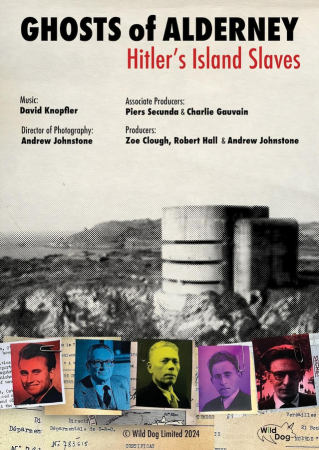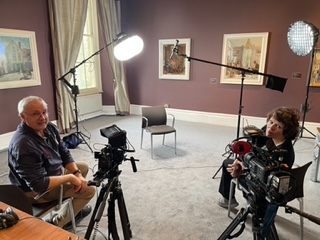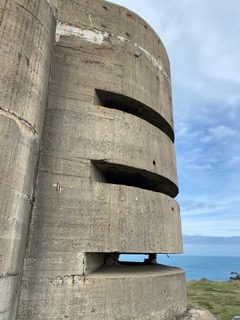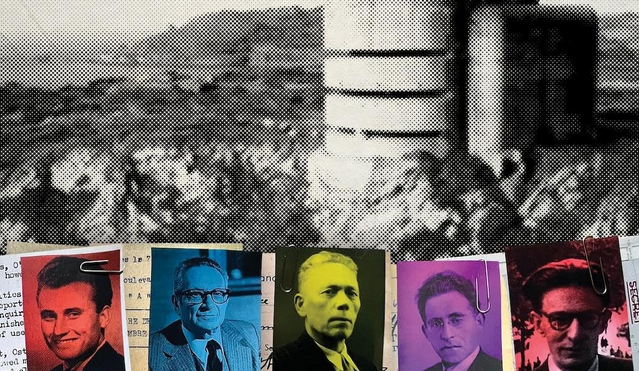The Ghosts of Alderney – Hitler’s Island Slaves – on U&Yesterday
Ghosts of Alderney : Hitler’s Island Slaves
Shameless plug alert – as a director of, and writer for, Totnes Pulse, there have to be a few perks.
Not just meeting great people and visiting interesting places, but an opportunity to get a trumpet out and blow it, so to speak, for myself…

Next Tuesday, November 11, Exeter Phoenix cinema is showing a documentary I had a hand in making.
It’s also on in Falmouth the next night and will be on British TV. UKTV – Tuesday 10th February at 10am on the U&Yesterday Channel
Ghosts of Alderney: Hitler’s Island Slaves tells the often horrific story of the Nazi occupation of this tiny Channel Island.

My involvement began, completely coincidentally, in Totnes when I got to know Robert Davidson. I made a film about him and during that met an artist, Piers Secunda, whose dad Robert had worked with back in the Sixties when Robert was an aspiring photographer. (He’s the man who snapped Zappa on the loo). A year or so later Piers cropped up again when me and my former BBC colleagues Robert Hall and Andrew Johnstone, all of us now freelance, got it into our heads to make a film about Alderney.
This was because the Government had just announced an inquiry into the atrocities which took place there during the German occupation of the Channel Islands. The Channel Islands were the only parts of British soil (not a part of the UK, but a Crown possession) to be invaded by German forces during the Second World War.
Jersey and Guernsey suffered terribly but it was Alderney, whose entire population had managed to flee, where the worst war crimes took place as thousands of slave workers from Occupied Europe were shipped in to build part of the Atlantic Wall, Hitler’s chain of coastal fortresses. The remains are still littering the countryside.
the biggest mass murder on British soil

As we found out, it’s a story of British Government cover- ups and the lack of any war crimes trials but it’s mostly about the people who suffered at the hands of the Nazis, who set up their only concentration camp on British soil.
And that’s where Piers comes in once more. Because he had become fascinated by the story and had spent by then three years researching the families of slave workers who had, miraculously, survived.
As an artist who documents the destruction of culture in war, visiting the ruins left by the Taliban in Afghanistan and Isis in Iraq, he wanted to do the same closer to home. And because Andy and I had got to know him, he decided he wanted to be a part of our documentary adventure. We visited families of French Jews, a Ukrainian forced labourer and a Spanish Republican fighter – all forced to work for Hitler’s builders – to hear their stories.
And in Alderney Piers showed us where a firing squad used to shoot people against a wall. It’s now part of a builders’ merchant – but the bullet holes are still there. Head height.
 The film questions why what happened in Alderney – described to me by one interviewee as “the biggest mass murder on British soil” – is so much less well known and reported on than other sites of atrocities. It is, after all, now agreed to be a place where the Holocaust happened.
The film questions why what happened in Alderney – described to me by one interviewee as “the biggest mass murder on British soil” – is so much less well known and reported on than other sites of atrocities. It is, after all, now agreed to be a place where the Holocaust happened.
Piers visits the Shoah memorial in Paris where tens of thousands of French Jewish names are inscribed. Yet in Alderney no memorial bears any names of the dead. “Even the birds left the bloomin’ place,” said one survivor of the island known as the Accursed Rock.
Even today, the tiny island feels oddly otherworldly.
Tickets: https://exeterphoenix.org.uk/events/ghosts-of-alderney-hitlers-island-slaves/


Sounds a very interesting project. Remember that the enemies of freedom come from the extreme left and the right. The price of freedom is eternal vigilance, as someone once said.
Excellent! Pleased our film is being screened in Devon and for the record, you had more than ‘a hand’ in making the film!